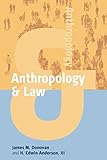Anthropology and Law / H. Edwin Anderson III, James M. Donovan.
Material type: TextSeries: Anthropology & ; 1Publisher: New York ; Oxford : Berghahn Books, [2003]Copyright date: ©2003Description: 1 online resource (246 p.)Content type:
TextSeries: Anthropology & ; 1Publisher: New York ; Oxford : Berghahn Books, [2003]Copyright date: ©2003Description: 1 online resource (246 p.)Content type: - 9781571814241
- 9781782386063
- 340.115
- K487.A57 D66 2005
- online - DeGruyter
| Item type | Current library | Call number | URL | Status | Notes | Barcode | |
|---|---|---|---|---|---|---|---|
 eBook
eBook
|
Biblioteca "Angelicum" Pont. Univ. S.Tommaso d'Aquino Nuvola online | online - DeGruyter (Browse shelf(Opens below)) | Online access | Not for loan (Accesso limitato) | Accesso per gli utenti autorizzati / Access for authorized users | (dgr)9781782386063 |
Browsing Biblioteca "Angelicum" Pont. Univ. S.Tommaso d'Aquino shelves, Shelving location: Nuvola online Close shelf browser (Hides shelf browser)

|

|

|

|

|

|

|
||
| online - DeGruyter Germany and 'The West' : The History of a Modern Concept / | online - DeGruyter Trapped in the Gap : Doing Good in Indigenous Australia / | online - DeGruyter Nimby Is Beautiful : Cases of Local Activism and Environmental Innovation around the World / | online - DeGruyter Anthropology and Law / | online - DeGruyter Breast Feeding and Sexuality : Behaviour, Beliefs and Taboos among the Gogo Mothers in Tanzania / | online - DeGruyter Day of the Dead : When Two Worlds Meet in Oaxaca / | online - DeGruyter Ultimate Ambiguities : Investigating Death and Liminality / |
Frontmatter -- Contents -- Preface to the Paperback Edition -- Preface to the First Edition -- Introduction. The Thesis of Balanced Reciprocity -- Chapter One. Practical Benefits of Anthropology to Law -- Chapter Two. Practical Benefits of Law to Anthropology -- Chapter Three. Theoretical Benefits of Anthropology to Law -- Chapter Four. Theoretical Benefits of Law to Anthropology -- Conclusion. Outlook and Recommendations -- Selected Bibliography -- Index
restricted access online access with authorization star
http://purl.org/coar/access_right/c_16ec
The relationship between Law and Anthropology can be considered as having been particularly intimate. In this book the authors defend their assertion that the two fields co-exist in a condition of "balanced reciprocity" wherein each makes important contributions to the successful practice and theory of the other. Anthropology, for example, offers a cross-culturally validated generic concept of "law," and clarifies other important legal concepts such as "religion" and "human rights." Law similarly illuminates key anthropological ideas such as the "social contract," and provides a uniquely valuable access point for the analysis of sociocultural systems. Legal practice renders a further important benefit to anthropology when it validates anthropological knowledge through the use of anthropologists as expert witnesses in the courtroom and the introduction of the "culture defense" against criminal charges. Although the actual relationship between anthropology and law today falls short of this idealized state of balanced reciprocity, the authors include historical and other data suggesting that that level of intimate cooperation draws ever closer.
Mode of access: Internet via World Wide Web.
In English.
Description based on online resource; title from PDF title page (publisher's Web site, viewed 25. Jun 2024)


